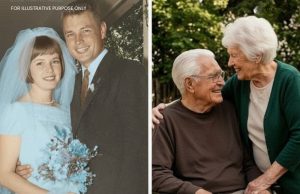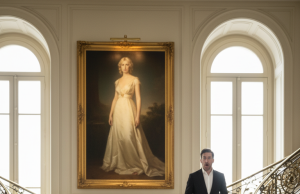
Sixteen years had passed since Timur left his native village, slamming the gate of his father’s house behind him. He was a young man back then—twenty years old, with a suitcase in hand and pain in his chest. All these years, his mother wrote to him: at first, often, every week, then once a month… over time, the letters became fewer. Meanwhile, he became wealthy. The capital city welcomed him without questions—business, money, expensive cars, dinners at trendy restaurants. But his heart remained there—in the distant village, where fresh bread baked in the oven, where the creek murmured, where she lived—his mother, Rania.
He hadn’t seen her once in all these years. He didn’t call. He didn’t even congratulate her on holidays. Shame? He felt it painfully. But he couldn’t find the strength to return. Then it seemed it was too late— or so he thought.
And then, one day, at the beginning of spring, he finally decided. He sat in his Lexus, put gifts in the trunk—medicine, money, a cashmere scarf for his mother. He wanted to ask for forgiveness. To hug her. Just kneeling down and saying, “Forgive me.”
The journey felt endless. Entering the village, he could barely recognize the street—new houses, asphalt roads, unfamiliar faces. Only one house remained the same, old and dilapidated— as if it had been waiting.
Timur got out of the car. His heart was beating fast, anxiously. He walked slowly forward.
And then he froze.
By the gate stood a woman. Young. In a light dress to the floor, with loose hair, holding a wooden bucket. She looked calmly, smiling slightly. And then—her eyes. Familiar. Like his mother’s.
He lost his words. He just stood there, unable to say anything.
“Who are you looking for?” she asked softly, tilting her head slightly.

“I…” he swallowed. “I’m looking for Rania. Is this her house?”
The woman lowered her gaze.
“It was. She passed away a year ago. Are you Timur?”
He nodded. His voice wouldn’t obey.
“I’m Sabina, your niece. Saida’s daughter. Mom left two years ago, and grandmother… waited for you till the very end. Every evening, she came to the gate. Believe it or not, but she said, ‘My son will come.'”
Timur closed his eyes.
“She left this for you,” Sabina took out a neatly folded sheet of paper from her pocket. “It was under her pillow. ‘For my Timur, if he ever comes back.'”
He took the letter with trembling hands. Unfolded it.
“Son. I’m sorry I couldn’t keep you back then. Sorry I didn’t hug you tighter. I prayed for you every day. I love you. I’m waiting. Mom.”
Timur dropped to the ground. No drama, no pride. Just—he cried…

Sabina sat beside him in silence—the kind of silence only shared by those who understand its weight and timing.
“And the house?” he finally asked.
“Grandma left it to us both. She said, ‘He will have a roof, and so will you. And maybe, if you’re lucky, you’ll become family.’”
That was the moment Timur, after sixteen long years, held someone close. Desperately. Honestly. Sabina leaned into him as if she’d always known the comfort of his presence. And something inside him—something buried for years—stirred and came alive again.
The next day, he didn’t return to his usual life. No calls. No deadlines. No suit. Just him at the gate—where someone had waited for so long.
Three days passed. He remained in his mother’s house. He ignored his phone. He spent time on the old bench under the apricot tree, watching the sky, breathing in the dust he once despised. Now, it smelled like memories—like healing.

On the fourth day, he opened the old chest. The one where Raniya kept everything—letters, drawings, clippings, even the envelope with the $100 he once sent without a message. Cold. Distant. Loveless.
Now, he wept—not for grief, but for shame. He had never said the words that mattered most: “Forgive me, Mom.”
Sabina—his niece—was so much like Raniya. Quiet. Perceptive. Alone since Grandma passed. She taught children, made jam, lived simply. But she was kind. Steady. And his family.
One day, Timur asked gently:
“Sabina, are you married?”
She smiled faintly. “Who would want someone like me? A village girl with debts, jam jars, and an old house?”
He didn’t answer. Just held her hand—silently.
A month later, the city was behind him. He wore his grandfather’s shirt, repainted the fence, cleaned the greenhouse. He rose at dawn—first visiting his mother’s grave, then working in the yard, then going to the market. People noticed. “He’s changed. Not a rich man anymore—he’s one of us.” The gossip stopped. Hope took its place.

At the village club, the forgotten old women gathered. Timur joined them.
“I’m the son who came back too late. Forgive me, for all the sons who never returned. I’m here now.”
He knelt before Zulfia-apa, kissed her hand. Tears flowed—from all of them. And for the first time, Timur stood without pride, without pretense. Just truth.
He built a small memory room in place of the old shed. It held his mother’s voice, letters, photos. Children, elders, strangers came. It smelled of apples, books, and stillness. And all who entered felt something real: warmth.
“This is her heart,” Timur would say. “Let it keep beating. Let them remember.”
Sabina became his daughter—not by law, but by love. One morning, she said softly:
“Dad, breakfast is ready.”
The word hit him like a miracle. He turned. And cried. After so long, “dad” became his redemption.
Two years went by.
Timur helped the village—built a library, connected the school to the internet. But most importantly, each morning, he opened the gate. Waiting. As his mother had once waited for him.
“Someone might return,” he said. “They should be welcomed. As I was.”
He left behind the wealth. In the village, he became a man again—with scars, with history, with forgiveness.
Three years passed.
The village stayed the same—familiar streets, blooming gardens, first snows. But the people changed. They smiled more. They stopped to greet one another. Someone had shown them the way—not to pass each other by.
It began with Timur. He stayed. He belonged. He mattered.
Raniya’s home stayed warm—even in winter. The walls held love. Memory. Forgiveness.
Sabina poured tea from her grandmother’s teapot. Timur, under a blanket on the bench, listened to the sounds of life—footsteps, laughter, children. Grandmothers visited, shared tea and worries. He always had time. Even for silence.
And when they left, they whispered, “You are our family. Our strength.”
Sabina flourished. Her smile brightened. Her confidence grew. No longer hidden behind chores and jam jars, she became the soul of the home. Sometimes, she played the old piano. Timur would sit beside her, just listening.
Once, he asked:
“What if I leave?”
“You’ve already let go,” she said. “I’ve grown. And you—can stay.”
He said nothing. Just kissed her head. And once again, silence said it all.
In the fourth spring, a stranger came to the village. A man in a fine coat, driving an Audi. A city architect, they said—interested in developing land nearby.
Sabina noticed him immediately. First at a meeting. Then at the library. Later, he brought apples, fixed shelves, offered rides.
Timur watched. Didn’t interfere. Until one evening, he asked quietly:
“Is he kind?”
“Yes, Dad. Very.”
“And does he love you?”
Sabina looked out the window.
“I think so. He looks at me the way you once looked at Mom’s photo.”
Timur exhaled. “Invite him for tea.”
Their wedding was small. In the yard. With cutlets, a samovar, and a scarf from the bride’s grandmother. The grandmothers cried. Timur prayed under the apricot tree.

“Mom,” he whispered. “I found the way home. And I passed the love on.”
But life brings more than joy.
A year later, Zulfia-apa suffered a stroke. Doctors said she wouldn’t survive a trip to the city. Timur didn’t give up. He brought a doctor, hired help, fed her, cleaned her, read to her.
Each time, he whispered:
“This is for you, Mom. For what I couldn’t do back then…”
Then one day—he came.
The man Timur had avoided naming for years.
His father.
Older, stooped, dressed neatly. He arrived by bus and stopped at the gate.
“You…?” Timur stood in the doorway.
“I heard you’ve become a good man. I won’t ask for anything. Just wanted to see you. Even from afar.”
Timur said nothing. Just opened the gate.
“Come in. Mom waited for you until the end. Now I understand why she forgave—even without a reply.”
His father didn’t move in. But he visited. Helped in the garden. Drank tea. They spoke not of the past, but the present. And it was enough.
Years passed. Timur aged. His hair turned gray. His steps slowed. But each morning, he opened the gate—just in case.
“Why?” someone once asked.
“Because there must always be doors that stay open,” he replied. “Otherwise, the heart forgets how to beat.”
Timur’s final days were quiet. He never left the village. It was where they found him. Where they buried him.
The village fell silent—not because he was gone, but because they understood: he had taught them to hope, to forgive, and to stay.
On the stone at Raniya and Timur’s grave, these words are carved:
“Sometimes the road home is the road to yourself.”
And everyone who reads them leaves a little changed.
A little closer to home.
A little closer to who they are.















